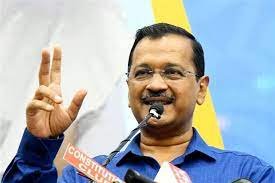
Delhi Chief Minister Arvind Kejriwal has stirred a fresh wave of controversy by refusing to comply with a summons issued by the Enforcement Directorate (ED) for his statement regarding the Delhi liquor policy case. Kejriwal, scheduled to appear before the ED’s Delhi office at 11 am, sent a letter to the agency, asserting that the summons was “illegal and politically motivated.”
The ED is expected to issue new summons to Kejriwal, who is presently campaigning for the Aam Aadmi Party (AAP) in Madhya Pradesh, ahead of the state election. It’s important to note that a person can evade ED summons a maximum of three times, after which the ED may resort to obtaining a non-bailable warrant. The ED can also enforce summons under the stringent Prevention of Money Laundering Act (PMLA).
In his letter to the ED, Kejriwal stated that the notice was sent “at the behest of the BJP” and urged the agency to withdraw it immediately. He argued that the summons lacked clarity about whether he was being summoned in his individual capacity, as Chief Minister of Delhi, or as the National Convenor of AAP. Kejriwal described it as a “fishing and roving inquiry.”
The AAP, led by Kejriwal, has consistently maintained that the charges against their top leaders are politically motivated. The ED’s case, which centers around a purported money trail of ₹338 crore, is related to the earnings of private parties who obtained liquor licenses under a now-defunct policy. The ED considers these earnings as proceeds of crime.
In response to Kejriwal’s refusal to attend the ED summons, the Bharatiya Janata Party (BJP) argued that the AAP had engaged in corruption, and its leaders should address the questions raised by the court and investigative agencies. BJP spokesperson Shehzad Poonawalla pointed out that the Supreme Court had denied bail to Manish Sisodia, citing a tentatively established money trail. He questioned Kejriwal’s claim of political motivation, given these circumstances.
Delhi Minister Saurabh Bharadwaj criticized the ED’s actions, alleging that the agency had been summoning individuals without court oversight. He emphasized the need for warrants and accused the ED of acting without regard for the rule of law.
The ongoing investigation revolves around corruption allegations in framing a new liquor sale policy, which was subsequently scrapped following reported rule violations. If arrested, Kejriwal would become the third senior AAP leader taken into custody in connection with the liquor policy case, with Manish Sisodia and Sanjay Singh facing similar fates in the past. Delhi Minister Satyendar Jain had also been arrested in a money laundering case last year.
As the controversy surrounding Kejriwal’s refusal to attend the ED summons continues to unfold, it intensifies the debate about the separation of politics and legal investigations, raising questions about the rule of law and accountability in India’s political landscape.
Sources By Agencies

